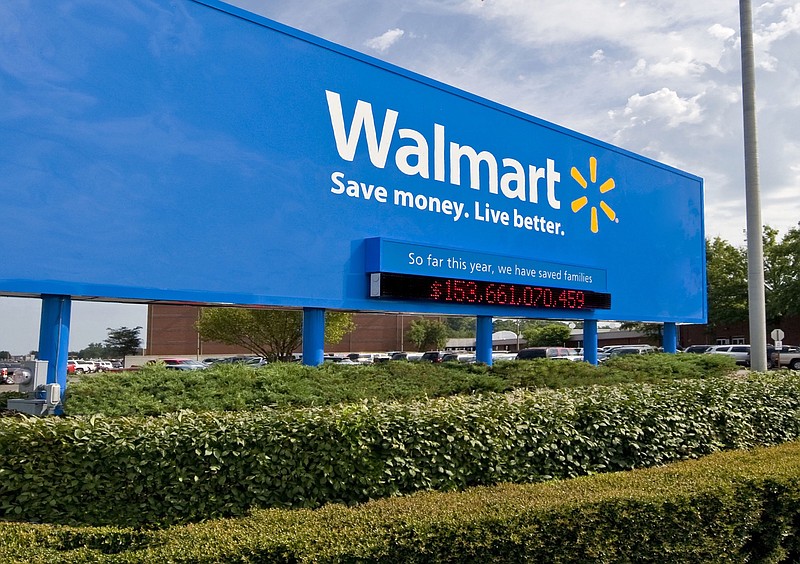Walmart Inc. is debuting its more affordable, private-label insulin in its U.S. store pharmacies this week, the company said Tuesday. The diabetes medication will be in Sam's Clubs nationwide by mid-July.
The Bentonville-based retailer said its ReliOn NovoLog is the first private-brand analog insulin. Manufactured by Novo Nordisk, it costs $72.88 per vial and $85.88 for FlexPens.
That saves customers between 58% and 75% off the cash price of brand insulin products, Walmart said, or up to $101 for brand vials and $251 for a package of brand FlexPens. The savings were calculated based on purchases without prescription drug insurance, the company said.
"The real innovation here is the price of the treatment," said Dr. Cheryl Pegus, Walmart's executive vice president of health and wellness. "We know many people with diabetes struggle to manage the financial burden of this condition, and we are focused on helping by providing affordable solutions."
"We also know this is a condition that disproportionately impacts underserved populations," Pegus said in a conference call with the media.
Walmart's goal is to improve health equity and health outcomes by lowering costs on its medications, and health and wellness products, she said.
The new analog insulin requires a prescription, unlike Walmart's ReliOn human insulin, which is available over the counter and costs about $25 per vial. Walmart spokeswoman Marilee McInnis said Walmart has sold ReliOn's NovoLin since 2000, and the price has stayed the same since 2011.
Human insulin is an older form of insulin that was taken from the pancreas of healthy animals and stored for human use, said Campbell Hutton, vice president of regulatory and health policy for JDRF, formerly known as the Juvenile Diabetes Research Foundation.
Since the 1980s, though, most insulins are made in a laboratory instead of coming from animals, Hutton said. The synthetics tend to work better for people with Type 1 diabetes, she said.
Tracey D. Brown, chief executive officer of the American Diabetes Association, said in a news release that the medical cost of diabetes is typically about $9,600 each year.
"We welcome all affordable solutions that make diabetes management more accessible to millions of Americans living with diabetes," Brown said.
The association says about 34 million adults and children in the U.S. have diabetes, though it doesn't break that figure down into Type 1 and Type 2.
In Arkansas, about 308,000 people, or 13.5% of the state's population, have been diagnosed as having diabetes, and another 70,000 have it but don't know it, according to an American Diabetes Association fact sheet. In addition, 796,000 people, or 34.6% of Arkansas' population, have pre-diabetes.
The fact sheet also does not state how many of those cases are Type 1 and Type 2.
Medical expenses for Arkansans with diabetes are about 2.3 times higher than for those who do not have the condition. Further, medical expenses related to both diabetes and pre-diabetes cost the state about $3.1 million each year, according to American Diabetes Association data.
The Southern chapter of the Juvenile Diabetes Research Foundation, which includes Arkansas, said in a statement Tuesday that Walmart's new treatment is "a step toward making insulin more affordable for everyone and could make a meaningful difference for some," but more needs to be done.
"No one should die because they can't afford their insulin," the nonprofit foundation said. It advocates for "affordable and predictable" out-of-pocket costs for insulin, which some people have to ration or do without at the expense of their health.
The Juvenile Diabetes Research Foundation said it "will continue to urgently drive long-term efforts and push for action from manufacturers, health plans, employers and the government to remove accessibility barriers."
Walmart's savings estimates are made off the list price of insulin, Hutton said, and aren't necessarily the out-of-pocket cost that individuals and families pay.
"Because people access their insulin through a variety of ways, using insurance or other programs, or without insurance, the cost to them is variable," Hutton said. "For some, the Walmart prices will be a savings, for others they will not be, and for others they will still not be affordable."
The Juvenile Diabetes Research Foundation doesn't have statistics on how many people with Type 1 diabetes rely on insurance benefits for insulin, Hutton said. "But we do know that, even for people with insurance, it is covering less," she said.
"A growing number of Americans are in high-deductible health plans, in which they need to spend thousands of dollars out-of-pocket before their insurance pays a dime," Hutton said.
"These families, as well as those who are uninsured, are exposed to 100% of the very high list prices of insulin and urgently need the cost of insulin to be lower and predictable," she said.
Information on patient assistance programs, discount coupons, community health centers and other resources for low-cost insulin is available at www.jdrf.org/costs.

